#CHAUCER BOOK AWARDS
Text
The Chaucer 2023 Book Awards Winners for Early Historical Fiction
The Chaucer Book Awards recognize emerging new talent and outstanding works in pre-1750s Historical Fiction. The Chaucer Book Awards is a division of the Chanticleer International Book Awards (The CIBAs).
The Chaucer Book Awards competition is named for Geoffrey Chaucer the author of the legendary Canterbury Tales. The work is considered to be one of the greatest works in the English language.…
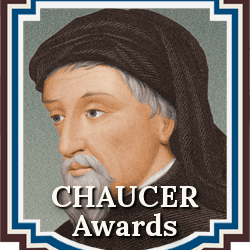
View On WordPress
#1600s#ancient history#Book Award Program#book awards#CAC#Chanticleer Authors Conference#Chanticleer Book Awards#Chanticleer Int&039;l Book Awards#Chanticleer International Book Awards#Chaucer Awards#CHAUCER BOOK AWARDS#Chaucer Contest Update#Chaucer Long LIst#CIBAs#CIBAs Book Awards#Classical#Dark Ages and Medieval Europe#Elizabethan#Grand Prize#Historic Novel Society#Historic Writers of America#Historical Fiction Awards#Historical Fiction contests#Historical Novel Society#HNSA#HWA#including pre-history#Pre-1750s Historical Fiction#Pre-1750s Historical Fiction Book Awards#Prestigious
0 notes
Text
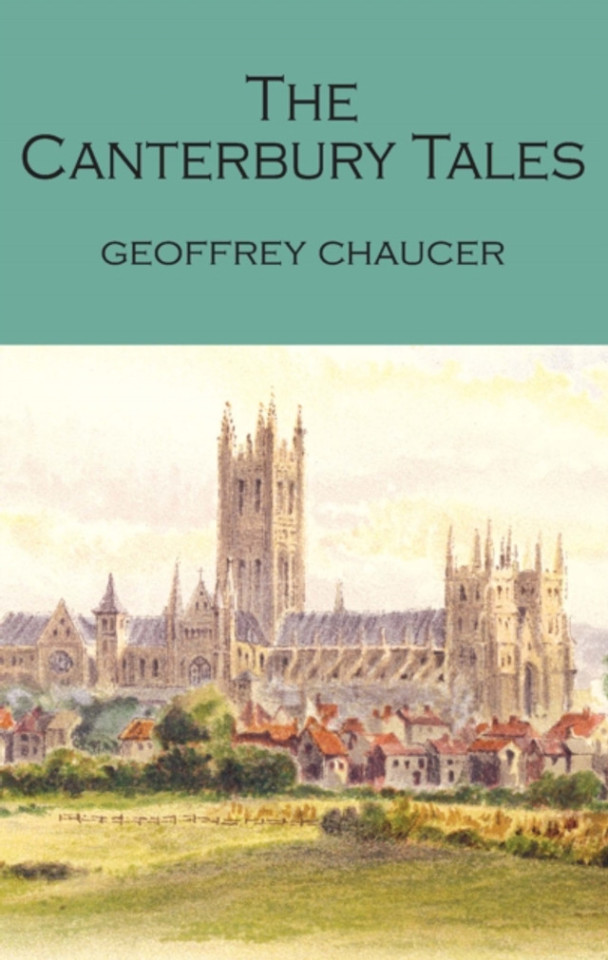
The Canterbury Tales tells the story of a group of 30 pilgrims who meet at the Tabard Inn in Southwark, and travel together to visit the shrine of St Thomas Becket in Canterbury cathedral. The tavern host, who accompanies them, suggests that they amuse one another along the way by telling stories.
During his life, Geoffrey Chaucer (born c.1340) was courtier, diplomat, revenue collector, administrator, negotiator, overseer of building projects, landowner and knight of the shire. He was servant, retainer, husband, friend and father, but is now mainly known as a poet and 'the father of English literature', a postion to which he was raised by other writers in the generation after his death.
It was Boccaccio's Decameron which inspired Chaucer, in the 1390s, to begin work on The Canterbury Tales, which was still unfinished at his death in October 1400. It tells the story of a group of 30 pilgrims who meet at the Tabard Inn in Southwark, on the south bank of the Thames opposite the city of London, and travel together to visit the then famous shrine of St Thomas Becket in Canterbury cathedral.
The tavern host, who accompanies them, suggests that they amuse one another along the way by telling stories, with the best storyteller awarded a meal in the tavern (paid for by all the others) on their return. The stories told by the pilgrims range from bawdy comedies through saints' lives and moral tracts to courtly romances, always delivered with a generous helping of Chaucer's own sly wit and ironic humour.
Although basing his characters on the stereotypes of 'estates satire', Chaucer succeeds in his aim of producing an overview of his times and their culture, for posterity, in the manner of Italian, proto-Renaissance, writers.
Daily inspiration. Discover more photos at Just for Books…?
15 notes
·
View notes
Text
Review: Katherine by Anya Seton
I know I know I said I would have time at the end of last year, but then I got bitten by a plot bunny and after that I had my annual New Year holiday at my mum’s, AND THEN I got bitten by another plot bunny…
TLDR: an enjoyable read, but my high expectations were disappointed.
The plot
At times the novel was very slow, but it felt slice-of-life looking at different aspects of the 14th century: the plague, jousts, pilgrimage, murder, the Peasant’s Revolt. The title ‘Katherine’ is rather misleading because the world around her is much more interesting than she is, frankly. And while the pace is slow, the murder of [SPOILER] is a good source of dramatic irony: waiting for the characters to find out the terrible secret.
You can see the seeds of the dynastic dispute that will become the Wars of the Roses: Mortimer thinking that his descendants by Philippa will get the throne sooner than John’s descendants. Cob’s subplot with Katherine was good.
Also good on Anya for not lazily confusing her history and remembering that the young Hotspur of Shakespeare is not the same as the historical dude, who was much older than Harry of Monmouth. It was good to see Hotspur, although I think his fame from Shakespeare is probably the reason he’s in the book. At times the book is like a who’s who of 14th century England: Katherine meets Julian of Norwich. It’s also fun to see Chaucer and the references to his work and historical people influencing his writing. I liked his perspective on the Peasants’ Revolt: he’s hidden in his rooms, passing the time with his stories, so he comes out to see the destruction like that gif of the man who enters the burning living room with pizza.
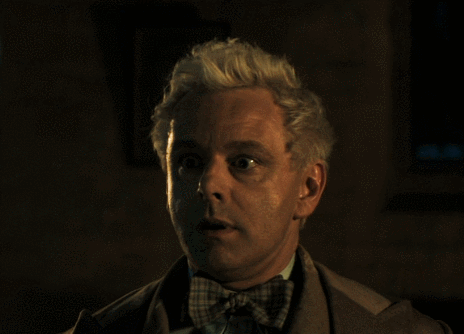
Gaunt confronts the archbishop at St Paul’s and it’s a great set piece.
More Wycliffe and John of Gaunt, please! I loved seeing John of Gaunt use Wycliffe for his own political ends. “John was truly devout in a hearty male way… he believed as his father and mother had believed, so Wyclif had ended by horrifying him.”
Whoever wrote that placard calling Gaunt a Flemish changeling…truly the winner of the Darwin Award. My guy, at least disguise your handwriting.
I did get a sense of the importance of religion to medieval people, which was good:
“What then was certain? What was there that would not shift and veer at the mercy of the winds of feeling?”
“Sanctity, the clergy said. Prayer. The practice of religion. The benevolence of the holy saints. The Grace of God.”
“He had not pointed out that the devil’s hand with the five fingers of lechery gripped a man by the lions, to throw him into the furnace of Hell.”
The action scenes, for want of a better phrase, are also well-written: “But on the second course he shattered the boy’s spear and, though his own lance point was broken off by the shock, he swerved Morel and, coolly slanting the butt of his lance into the boy’s armpit- beneath the breastplate, lifted him from his saddle and deposited him on the ground.”
The writing
“During the time of terror and hideous death there had been no dignity of mourning, and now in the honours done the Duchess they could weep quietly for their own dead, too.”
The plague sequence was well written: atmospheric, full of doom and dread.
Sometimes the writing was….IMHO, bordering on the silly. “Lay bathed in a moony light” “the blue Percy lions on their surcoats jigged in and out with their fierce breathings.” Anya, baby, don’t write under the influence. It’s not a good idea.
The medieval songs were a welcome inclusion that made the world feel more real.
There are some good turns of phrase in this book: “He’s swollen with pride and no doubt March has been puffing it with the hot air of promises.”
“Bloodshed-“ the friar smiled faintly. “Blood is all you knights understand.”
“There’s still the bishops! May the devil’s pitchforks prick their fat rumps until they’ve bled out all the gold!”
“like released bowstrings, the two hundred diners jumped to their feet and waited.”
Anya writes crowds and the mood of crowds well, she is good at depicting mass hysteria and mob mentality. “Already a dozen heads had rolled into the central gutter, which ran crimson. Vultures and kites perched high above on the house gables, watching as intently as the crowd did.”
There are some lovely expressions of emotion. “Humility struck Katherine, even shame that she had dared to expect love from such a man as this.” “Am I then nothing of myself? She thought with anguish. Can I not live apart from memories of him”
There’s humorous moments too. “The excited fishmonger had just caught sight of Katherine standing like a church statue beyond his angry wife.” “She held out a fat dimpled hand so loaded with diamonds that Katherine, as she curtsied, could scarce find space to kiss.” “There he may cool his ardours by taming the Scots, who are rampaging as usual. God bless them.” “They were recounting with relish the horrors of the revolt in London two months ago, while a Norfolk man insisted that they had had a worse time of it up here than any Londoner could know.” “Five children stood by a thatched stable which enclosed crudely painted homemade figures of the nativity, and loudly disputed whether the Baby were smiling or not.”
The characters
Take a shot every time Katherine’s beauty is mentioned or described. You will pass out. There are fewer references to her beauty as the book goes on.
“She had beauty still, the thinness of her flesh but exposed the grace of her bones and sinews.”
…mostly fewer references.
“He reached out his finger to touch the white streaks at her temples. “Age on you has but added swan’s wings to your fairness,” he said wryly, “while I’m grizzled and hacked like an old badger.”
I said FEWER references, not none.
“They stared at each other in a struggle that racked them both, and she clung to the sudden enmity between them as a shield.” “They stood looking at each other, breathing as though they raced with time.”
The chemistry between John and Katherine has promise, but the development of the attraction is pretty thin. There is attraction between them but at almost halfway through the book, I still didn’t get what Katherine’s appeal was to him, apart from her beauty. She’s the main character, yet I didn’t get a sense of a personality. Philippa ‘Pica’ Chaucer might be brash and grating to the people around her, but at least I could describe her to you. What’s Katherine’s personality? Um…she’s beautiful? She’s a controlling parent to Blanchette? She’s a loyal friend to Blanche? And….um…yeah.
John goes from desiring Katherine to suddenly saying he loves her: it’s a very abrupt change in his feelings.
“Inclination and good taste” prevent Katherine from interfering in politics. It’s “men’s business” and she’s framed as better than that meddling realm-ruiner Alice Perrers (boo!hiss!)
It might seem hypocritical of me to criticise Katherine being apolitical- didn’t I just say I wanted Katherine to have more personality and now she has a definable personality trait I’m criticising it for not being the personality I wanted?
But I do think it’s a missed opportunity. Yes, I’m biased, I like scheming women, but I really do think it would be a more interesting book if Katherine paid attention to John of Gaunt’s activities, maybe even advised him. It would serve as a window into John of Gaunt, who he is, what drives him. There’s nothing wrong with wanting the quiet life but it does make Katherine rather passive. Dozens and dozens of pages go by without Katherine and the duke interacting. Their reunion at the end is lovely, but it would be even better if their relationship was well-developed. “This castle was his, the bread she ate, the clothes she wore came from his bounty. Like the hundreds in his retinue, like his children, like this young squire who stood waiting respectfully before her, she had no course but submission.” I like the realism of this passage, but again, it does feel like a missed opportunity to get closer to John of Gaunt’s inner workings. There is a scene where John confides in Katherine by her coaxing, and it’s a pleasant scene, but it’s all the more frustrating because it’s the only time. “His need for her deepened, he talked to her more freely about all his concerns, and he kept her with him constantly, showing her many public as well as private signs of his love.”
That’s the good stuff! I don’t want that information in passing, I want to see it happen! That’s what I want to read! Not Reminder no. 312 that Katherine Is Beautiful!
(Maybe this is a sign that I should be reading a novel about Alice Perrers instead. Or writing one? Eyes emoji.)
“But by night, sometimes she was with him in dreams. In these dreams there was love between them, tenderness greater than there had really been. She awoke from these with her body throbbing and a sense of agonising loss.” I was struck by the nuance and the pessimism of this passage. It was a different kind of love story than I had expected from a ‘classic romance’.
“She was no longer simply ‘Katherine’ she must adjust again to the various labels that the world would give her, and the demands fair and unfair that it would make.”
That’s great but I still don’t know who Katherine IS beneath all these labels!!
I did like this moment with Katherine during the Peasants’ Revolt. Anya astutely summarised some historical truths: she gets it right where Margaret Mitchell got it wrong:
“A good manor lord cares for his serfs,” she continued. “He gives them ale feasts and alms. In time of trouble he protects them, feeds them, and he administers justice for them that they have not the understanding to do for themselves. They’re like his children.”
The friar gave his rare chuckle. “You voice the arguments for slavery that are old as Babylon and have satisfied many. There are however others who prefer freedom to any benefits – I don’t know,” he added half to himself, “what is God’s law.”
I was not expecting Katherine to imprison her daughter for disobedience, especially as the real Blanchette seems to have died younger.
(However, espousing the views of the time is still not a personality.)
“Katherine, who was always just, stroked the dark curls.” Always just??? Anya?? My sister in Christ, she bullied Blanchette into marriage, that’s not just!!
Anya definitely has Opinions about gender roles. Katherine’s femininity is Good and Modest and Natural, Richard’s femininity is Sinister and Unnatural.
“Ay, there was perversion of all sorts dwelling behind those tinted beardless cheeks, the gold-powdered curls, the tall slender body that bore itself so haughtily in violet brocade which gave forth a wave of scent as he passed.”
“Next came a giggling, mincing group of young men in skintight hose that showed their thighs, and more, and who wore velvet shoes with points half a yard long – Richard’s contemporaries and cronies.”

Why is literally everyone in this novel more interesting than Katherine? This novel is like a bagel: a hearty ring, but the centre is a hole, a void.
6 notes
·
View notes
Photo
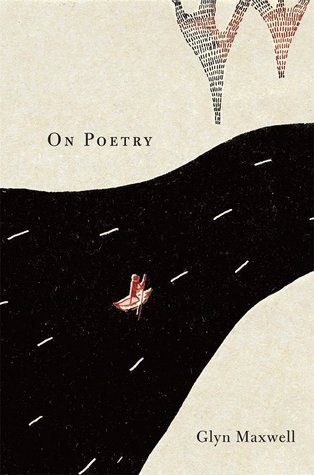
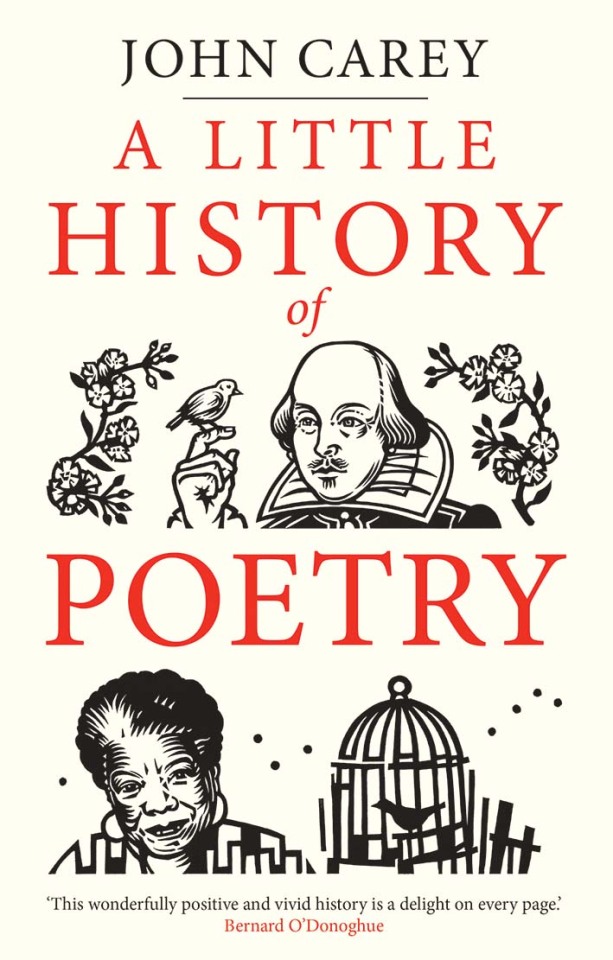
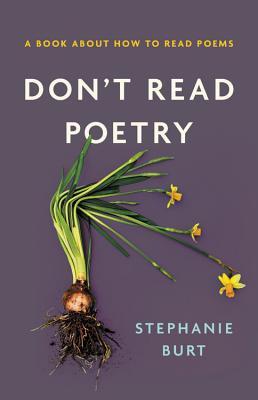
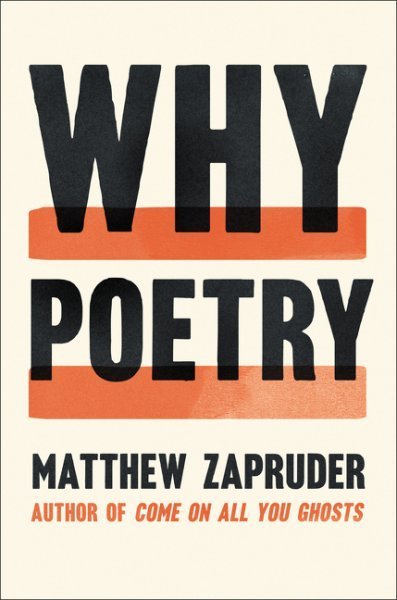
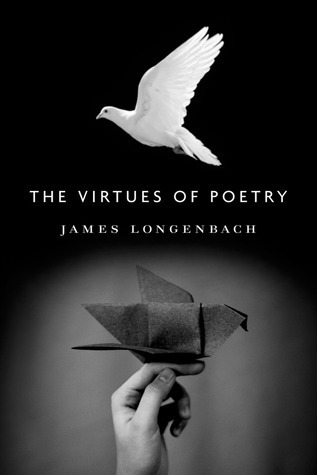
Book Recommendations: Books About Poetry
On Poetry by Glyn Maxwell
A collection of short essays and reflections on poetry from the acclaimed British poet Glyn Maxwell. These essays illustrate Maxwell’s poetic philosophy, that the greatest verse arises from a harmony of mind and body, and that poetic forms originate in human necessities – breath, heartbeat, footstep, posture. He speaks of his inspirations, his models, and takes us inside the strange world of the Creative Writing Class, where four young hopefuls grapple with love, sex, cheap wine and hard work. With examples from canonical poets, this is a beautiful, accessible guide to the most ancient and sublime of the realms of literature.
A Little History of Poetry by John Carey
What is poetry? If music is sound organized in a particular way, poetry is a way of organizing language. It is language made special so that it will be remembered and valued. It does not always work—over the centuries countless thousands of poems have been forgotten. This little history is about some that have not.
John Carey tells the stories behind the world’s greatest poems, from the oldest surviving one written nearly four thousand years ago to those being written today. Carey looks at poets whose works shape our views of the world, such as Dante, Chaucer, Shakespeare, Whitman, and Yeats. He also looks at more recent poets, like Derek Walcott, Marianne Moore, and Maya Angelou, who have started to question what makes a poem "great" in the first place. This little history shines a light on the richness and variation of the world’s poems—and the elusive quality that makes them all the more enticing.
Don’t Read Poetry by Stephanie Burt
In Don’t Read Poetry, poet and literary critic Stephanie Burt offers an accessible introduction to the seemingly daunting task of reading, understanding, and appreciating poetry. Burt dispels preconceptions about poetry and explains how poems speak to one another—and how they can speak to our lives. She shows readers how to find more poems once they have some poems they like, and how to connect the poetry of the past to the poetry of the present. Burt moves seamlessly from Shakespeare and other classics to the contemporary poetry circulated on Tumblr and Twitter. She challenges the assumptions that many of us make about “poetry,” whether we think we like it or think we don’t, in order to help us cherish—and distinguish among—individual poems.
Why Poetry by Matthew Zapruder
In Why Poetry, award-winning poet Matthew Zapruder takes on what it is that poetry—and poetry alone—can do. Zapruder argues that the way we have been taught to read poetry is the very thing that prevents us from enjoying it. In lively, lilting prose, he shows us how that misunderstanding interferes with our direct experience of poetry and creates the sense of confusion or inadequacy that many of us feel when faced with it.
Zapruder explores what poems are, and how we can read them, so that we can, as Whitman wrote, “possess the origin of all poems,” without the aid of any teacher or expert. Most important, he asks how reading poetry can help us to lead our lives with greater meaning and purpose.
The Virtues of Poetry by James Longenbach
The Virtues of Poetry is a resplendent and ultimately moving work of twelve interconnected essays, each of which describes the way in which a particular excellence is enacted in poetry. Longenbach closely reads poems by Shakespeare, Donne, Blake, Keats, Dickinson, Yeats, Pound, Bishop, and Ashbery (among others), sometimes exploring the ways in which these writers transmuted the material of their lives into art, and always emphasizing that the notions of excellence we derive from art are fluid, never fixed. Provocative, funny, and astute, The Virtues of Poetry is indispensable for readers, teachers, and writers. Longenbach reminds us that poetry delivers meaning in exacting ways, and that it is through its precision that we experience this art's lasting virtues.
#poetry#poetry month#National Poetry Month#literary criticism#nonfiction#nonfiction books#nonfiction reads#Nonfiction Reading#Library Books#Book Recommendations#book recs#Reading Recs#reading recommendations#TBR pile#tbrpile#tbr#to read#Want To Read#Booklr#book tumblr#book blog#library blog
5 notes
·
View notes
Text
Book Review The Hussar's Duty Griffin Brady #HistoricalFiction #WingedHussars #BlogTour #TheCoffeePotBookClub @griffbrady1588 @cathiedunn

FEATURED AUTHOR: GRIFFIN BRADY
It is my pleasure to host Griffin Brady again as the featured author in The Coffee Pot Book Club Blog Tour that is being held between June 19th — June 30th, 2023. Griffin Brady is the author of the Historical Fiction novel, The Hussar's Duty (The Winged Warrior Series, Book 3), released by Trefoil Publishing on May 18th, 2023 (538 pages).
I previously reviewed the first book in the series, The Heart of a Hussar, set during the 17th-century Polish-Muscovite war, a period with which I was not familiar. The first novel had everything I enjoyed reading in epic historical fiction — fully developed characters, adventure, romance, political intrigue, and world-building. The third book continues the rich tradition of the first book and motivates me to read the second book in the series, A Hussar's Promise.
Below are highlights of The Hussar’s Duty, Griffin Brady's author bio, and my 5-star review of her novel.
Tour Schedule Page: https://thecoffeepotbookclub.blogspot.com/2023/04/blog-tour-hussars-duty-by-griffin-brady.html
HIGHLIGHTS: THE HUSSAR'S DUTY
The Hussar’s Duty
(The Winged Warrior Series)
by Griffin Brady
Blurb:
Poland’s most valiant winged hussar is called to fight in a campaign ripe for disaster. But he must also protect those he loves from jackals waiting to pounce. How does he choose between duty and devotion when death is on the line?
When Sultan Osman II sends Poland's envoy packing, the Commonwealth must prepare for war against one of the largest armies the Ottomans have ever assembled. Tasked with repelling the invasion is Grand Hetman of the Crown Stanisław Żółkiewski, and he knows who to turn to: Jacek Dąbrowski, the Commonwealth’s most valiant Polish winged hussar.
Jacek has been idle far too long, and the call to arms is a siren’s song he can’t resist. But he has built a life far from the battlefield with his wife, Oliwia, and their children. If he pursues his quest for glory, who will safeguard them?
Oliwia knows her husband is restless. In fact, she’s been sending Jacek on cross-country errands for years in the hopes of quelling his lust for battle. When she realizes her efforts are futile, she resolves herself to letting him go—after hatching a scheme to accompany him.
Honor. Obligation. Devotion. These forces push and pull Jacek in different directions. His country needs him, but so does his family. Where does his duty lie? His choice will cause catastrophic ripples no matter which path he follows … and could very well bring the loss of his loved ones or his life.
Will the cost of defending king and country prove too steep for this warrior?
This is a standalone continuation in The Winged Warrior Series.
Buy Links:
This title is available to read on #KindleUnlimited.
Universal Link: https://readerlinks.com/l/3336453
Amazon US: https://www.amazon.com/dp/B0C2VZ2963/
Amazon UK: https://www.amazon.co.uk/dp/B0C2VZ2963/
Amazon AU: https://www.amazon.com.au/dp/B0C2VZ2963/
Amazon CA: https://www.amazon.ca/dp/B0C2VZ2963/
AUTHOR BIO: GRIFFIN BRADY
Griffin Brady is an award-winning historical fiction author with a keen interest in the Polish Winged Hussars of the 16th and 17th centuries. She is a member of the Historical Novel Society and Rocky Mountain Fiction Writers. Her debut novel, The Heart of a Hussar, was a finalist for the 2021 Chaucer Early Historical Fiction Award and a 2021 Discovered Diamond.
The proud mother of three grown sons, she lives in Colorado with her husband. She is also an award-winning bestselling romance author who writes under the pen name G.K. Brady.
Social Media Links:
Website: https://www.griffin-brady.com/historical-fiction/
Twitter: https://twitter.com/griffbrady1588
Facebook: https://www.facebook.com/AuthorGriffinBrady
Book Bub: https://www.bookbub.com/profile/griffin-brady
Amazon Author Page: https://www.amazon.com/author/griffinbrady
Goodreads: https://www.goodreads.com/author/show/20675881.Griffin_Brady
BOOK REVIEW: THE HUSSAR'S DUTY
Loyalties and honor are blurred in war-torn Poland in the historical fiction novel, The Hussar's Duty by Griffin Brady, as the Polish-Lithuanian Commonwealth prepares to fight Ottoman troops at the Battle of Cecora in 1620. Book 3 in the Winged Warrior series continues the saga of Jacek Dabrowski, an elite Hussar commander, and his wife, Oliwia, an heiress of the estates of her former husband. Although this is the 3rd book in the series, with sufficient backstories from Book 1 (The Heart of a Hussar) and Book 2 (A Hussar's Promise), it can be read as a standalone. However, it would be helpful to read the first two books to fully grasp Jacek and Oliwia's ordeals before marrying.
Even though Jacek is in marital bliss raising Oliwia's son, fathered from her former husband, and their own two children, the estate is plagued with financial hardship. Another challenge is Oliwia's teenage brother's rebellion against training under the mentorship of Jacek. A soldier itching for action and glory, Jacek is pulled from a sense of duty to fight for his former seventy-year former commander, Stanisław Żółkiewski, in a possible confrontation with the Ottoman Empire. Like many disputes throughout history, the goal of protecting the ruler of the neighboring kingdom of Moldavia seems like a just cause. What Jacek does not expect are the divisive loyalties of mercenaries and magnates lacking in discipline and morale. His duty as a Hussar and his undying love for his family is tested in the hell of the Battle of Cecora.
Author Griffin Brady has masterfully written a gripping family saga with strong elements of romance interwoven into action/adventure. It is a character-driven tale in which Oliwia and Jacek fundamentally change due to their life-threatening circumstances. The author's meticulous research is evidenced by her descriptive details of the Polish culture, political turmoil between the warring Polish Commonwealth and Ottoman Empire, and battle scenes. She stays true to actual events and terms used in the period. A glossary of terms and historical figures' backgrounds are bonuses at the back of the book.
The tale starts slowly but sets the stage for the climactic battle steeped in action, unexpected twists, and heart-wrenching scenes in which you don't know who will survive. The tension becomes razor-sharp in the last half of the book when Jacek recognizes that everything he believes as an honorable warrior is turned on its head. Immoral mercenaries and wavering magnates fight for their self-interest. He questions the judgment of his aging commander, who leads them into a battle where they are outnumbered. The universal themes of duty vs. love, corrupt political power, sacrifice, and friendship are explored in this riveting story. It has a satisfying ending that will leave you pondering the justice of war.
Readers who enjoy historical romantic adventure will become immersed in Jacek's struggle to balance love for his family and to seek glory and ambition in his duty as a Hussar to the sovereignty of Poland. Highly recommended.
Instagram Handle: @thecoffeepotbookclub
Read the full article
0 notes
Text

FLP POETRY BOOK OF THE DAY: The Deadly Shadow of the Wall: Poems by R. W. Haynes
TO ORDER GO TO: https://www.finishinglinepress.com/product/the-deadly-shadow-of-the-wall-poems-by-r-w-haynes/
R. W. Haynes, Professor of English at Texas A&M International University, has published poetry in many journals in the United States and in other countries. As a scholar, he specializes in British Renaissance literature, and he has also taught extensively in such areas as medieval thought, Southern literature, classical poetry, and writing. Since 1992, he has offered regular graduate and undergraduate courses in Shakespeare, as well as seminars in Ibsen, Chaucer, Spenser, rhetoric, and other topics. In 2004, Haynes met Texas playwright/screenwriter Horton Foote and has since become a leading scholar of that author’s remarkable oeuvre, publishing a book on Foote’s plays in 2010 and editing a collection of essays on his works in 2016. Haynes also writes plays and fiction. In 2016, he received the SCMLA Poetry Award ($500) at the South Central Modern Language Association Conference. Three collections of his poetry have been published, Laredo Light (Cyberwit 2019), Let the Whales Escape (Finishing Line Press 2019), and Heidegger Looks at the Moon (Finishing Line Press 2021).
ADVANCE PRAISE FOR The Deadly Shadow of the Wall: Poems by R. W. Haynes
The Laredo of R. W. Haynes’ poetry is a troubled ground, simultaneously at the border of Texas and Mexico and the divide between the mythic and mundane, godly and profane. Sometimes the frustration with mindlessness and delusion rises like a horrible fever. But just in time music, humor, and a dog who knows better arrive to enliven the lonely byways. In those moments, when wandering academics disturb the dust of dead cowboys and avaricious Spaniards, a spirit awakens even in the ludicrous. Best of all, in this collection Haynes playfully wrestles with the discipline of the sonnet and formal verse, both paying homage to tradition and infusing it with a colloquial voice uniquely his own.
–Gerald C. Wood is the author of Horton Foote and the Theater of Intimacy, casebooks on Foote and Neil LaBute, and Conor McPherson: Imagining Mischief. He also wrote Smoky Joe Wood: The Biography of a Baseball Legend. Wood is Emeritus Professor of English at Carson-Newman University.
Please share/please repost [PROMO]#flpauthor #preorder #AwesomeCoverArt #poetry #read #poetrybook #poems
#poetry#preorder#flp authors#flp#poets on tumblr#american poets#finishing line press#small press#book cover#books#publishers#poets#poem#smallpress#poems
0 notes
Photo

In Hollywood, it’s said that for a major motion picture, you should never set two scenes in the same spot. Visually, it’s boring—so much so that viewers become visually fatigued. So you almost never see a movie like “My Dinner with Andre,” where nearly the entire film takes place in a single setting. If two scenes are filmed in the same room, they are often done so at different times of the day or night, or they are redecorated, or are filled with new characters..
With stories, we have a similar problem. I call it audio fatigue. It’s easy to fall into routines where we overuse words, or repeat words, or create characters who all sound the same.
It’s especially hard for authors to deal with this because the whole novel really does all come from one person’s imagination.
So let’s examine a few ways to avoid creating audio fatigue.
Vary your word choices. Many times, you’ll find that you must use the same words over and over. For example, if two men are trying to fix a radiator on a truck, you will probably need to say “radiator” several times.
But there are certain words people frequently overuse. I often find writers who don’t seem to have an alternative for look. Their characters never glance, peer, gaze, or stare. Even worse, the author almost always uses look instead of appearance so that the author says things like, “He looked through the scope of the rifle and saw Sarah. She looked good in her long blue coat. She was looking into her purse for her keys.”
The reason that words get overused is obvious. Your brain starts searching for a word to describe a noun or action and it comes up with the first variant in its files. You might have 900,000 neural connections to look at, and only 50,000 connections to peer. So your character ends up “looking” instead of ogling.
These words seem invisible to the author, and there are hundreds of them: was, were, walked, moved, turned, thought, said, that, just, really, asked, and so on.
One author friend made a list of dozens of words he overused, then, when he finished a story, he’d search for each one and see if he could write it out. I don’t think it was a coincidence that he began getting nominated for Hugo and Nebula awards within a matter of weeks.
Some words seem invisible to the author but don’t have a place in most manuscripts. For example, modifiers like just and then can almost always be cut to good effect. In the sentence “The lightning flashed, then the thunder rumbled,” we can take out then.
In fact, one word that gets overused is the. In the sentence above, we can take out all uses of the. “Lightning flashed, thunder rumbled.”
I often see writers who seem to have a limited vocabulary. They use adjectives that every four-year-old knows. So ,they will describe something like, “a little man sat in the old rocker.” It almost sounds as if the author is trying to avoid surprising the reader with his word choice.
Because of this, we need to search for ways to invigorate our descriptions through careful word choice.
Entire sentence structures can become boring if used too often. For example, earlier today I read a manuscript where nearly every sentence of dialog ended with some variation of “said XXX.” There were no bits of dialog where the tone was described first, or places where the dialog was broken into small chunks so that the reader knew who was speaking before a paragraph finished. Instead, the dialog tags all felt tacked on. Even the “said XXX” was not varied with “XXX said.” So we had the formula Dialog+Said+Character Name over and over.
Many authors use short sentence structures repeatedly. They might say, “The day was gray and rainy. There was water running in the gutters.” The author is stuck in a Subject+Verb+Object pattern, often with a weak verb. Wouldn’t it be better to combine some images and strengthen the verbs? “Gray rain spattered the pavement, glistening, water burbling through gutters.”
One trap that authors often fall into is using the gerund form of verbs: To Be+Gerund. “John was wading through the swamp. Crocodiles were sunning themselves on the bank and looking at him hungrily.” You see the problem: the author gets lots of weak, unnecessary verbs followed by a verb that ends with -ing.
Worst though is the problem of character voices. Most novels have a consistent narrator, the author, who tells a whole story. Rarely does that narrator try to change tone in a novel, and that lends a sense of consistency to a work, but it can lead to a kind of audio fatigue for the reader to have the same narrator droning on for four hundred pages.
Fortunately, when different characters talk, we get a break from that monotone—unless the writer is so careless that the speakers all sound the same.
As early as Chaucer, I’ve seen comments from authors on the virtue of trying to make character voices sound differently. Tolkien believed that one key to putting a reader into a dream state was to relate your tale in a framework where multiple narrators are speaking in different voices.
I think he was on to something. Indeed, some scholars have criticized him for writing in very different tones and styles in various parts of Lord of the Rings, but it’s obvious that he very consciously altered his narrative tone based upon the area that his characters were visiting. (He was trying to resonate with different cultures.) I could go deeper into that, but it would take too long. (See my comments on Resonance in the book Writing Wonder.)
I sometimes think that we might write better if we learn to listen. Many authors like to read their work aloud as part of the editing process. For years, I’ve recommended that you read and write each character’s dialog (and any scenes told from their viewpoints) separately, so that you can catch the tone of their voices and not stray.
I might add, that I think that the same should be done with the narration and description, if it comes from the author’s point of view.
The whole point of these editing techniques is to fix a problem that hasn’t even had a name yet, at least that I’m aware of. I’ll call it audio fatigue. We want to keep our audio captivating, so we can hold our readers rapt.
12 notes
·
View notes
Text
friday 16/10/2020
the history of publishing with David


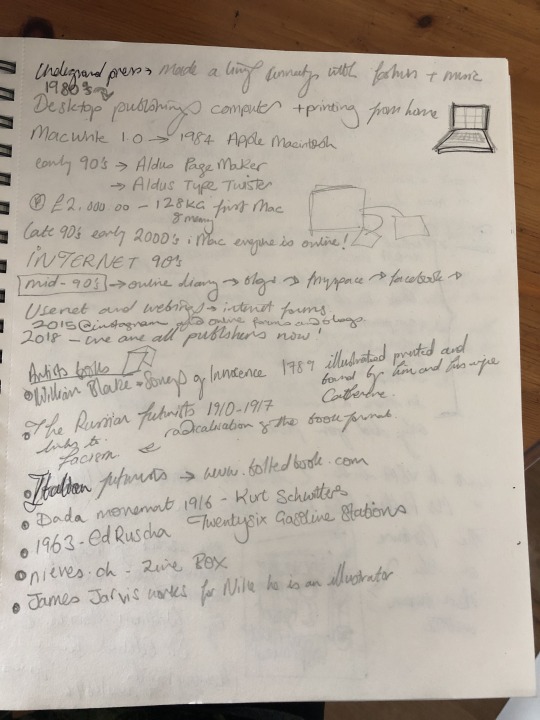
task 1

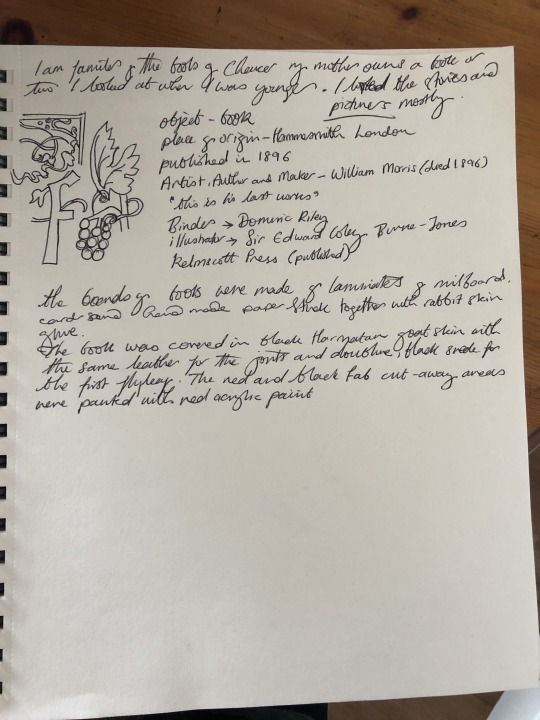
i chose this book for the pre 2000

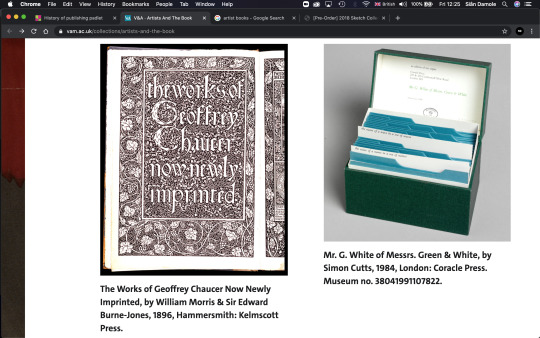
Info from the V&A Search the Collections website
Book - The Works of Geoffrey Chaucer, Newly Imprinted ...
Book - The Works of Geoffrey Chaucer, Newly Imprinted ... Object: Book
Place of origin: Hammersmith (published) Date: 1896 (published)
Artist/Maker: Morris, William, born 1834 - died 1896 (printer)
Riley, Dominic (binder)
Burne-Jones, Edward Coley (Sir), born 1833 - died 1898 (illustrator) Kelmscott Press (published)
Materials and Techniques: 'The boards of the book were made of laminates of millboard, card and hand made paper, stuck together with rabbit skin glue. [. The book was covered in black Harmatan goatskin, with the same leather for the joints and doublure, black suede for the first flyleaf, and red and black Fab cut-away areas were painted with red acrylic paint.
The gold tooling and board edges was done by Trevor Lloyd, and I tooled both the title panels and the lines on the front and back cover. The binding is sig The book is housed in a double-walled, reinforced clamshell box lined with double red-and-white suede pads, and with a title label on the spine.' Dominic R
Credit Line: Given/Loaned by the American Friends of the V&A through the generosity of: Paul Chrzanowski. Museum number: LOAN:AMERICANFRIENDS.716-2016
Gallery location: National Art Library
Public access description
The Works of Geoffrey Chaucer published by the Kelmscott Press was the last great work of William Morris, and the icon of the private press movement, the printing revival he inspired. The volume contains 87 wood-cut illustrations by Edward Burne-Jones, who was a close friend of Morris. The Gothic-inspired type was specially designed by William Morris and named 'Chaucer' after this book.
The book brought together Morris's passion for the medieval period and his commitment to beautiful hand-crafted productions and was published shortly before he died. 425 copies were printed, sold at £20 each.
This Kelmscott Chaucer had an undistinguished binding when acquired by the present owner, so that he felt justified in altering its condition. He selected Dominic Riley, a distinguished British designer bookbinder for the commission. Riley studied at the London College of Printing. He has won several major bookbinding awards, and was elected a Fellow of the Designer Bookbinders in 2008. He now works and teaches in Britain and the US.
The binder conceived the work as an overt homage to Morris, basing the design upon the mirror forms of his initials: ‘W M’. Several
techniques were used (including modern digital methods to produce the stamps). The final work is grand and dignified, its geometric exactness relieved with touches of naturalistic ornamentation based on the book’s border decoration, and its use of the colour red echoes the red used for the rubrics in the text (based on medieval and Renaissance practice of highlighting headings in red ink).
Descriptive line
The Works of Geoffrey Chaucer, Newly Imprinted ... (Hammersmith: Kelmscott Press, 1896), newly bound by British designer bookbinder Dominic Riley.
Physical description
Hand-printed book on paper with goatskin binding.
Dimensions
Height: 44 cm
Museum number
LOAN:AMERICANFRIENDS.716-2016
Object history note
Given/Loaned by the American Friends of the V&A through the generosity of: Paul Chrzanowski, 2016.
URL
http://collections.vam.ac.uk/item/O1407076/the-works-of-geoffrey-chaucer-book-morris-william/
2. info from https://collections.artsmia.org/art/80115/the-works-of-geoffrey-chaucer-now-newly-imprinted-william-morris
Details
Title The Works of Geoffrey Chaucer, now Newly Imprinted
Dated1896
Artist William Morris;
Author: Geoffrey Chaucer;
Illustrator: Edward Coley Burne-Jones;
Engraver: Wood engravings by William Harcourt Hooper;
Editor: Frederick S. Ellis;
Printer: William Morris at Kelmscott Press, Hammersmith, England;
Publisher: Kelmscott Press, Hammersmith, England
Nationality British
Artist Life 1834 - 1896
Role Designer
Gallery Not on View
Department Prints and Drawings
Dimension 17 x 12 x 2 5/8 in. (43.18 x 30.48 x 6.67 cm)
(closed)30.5 cm 43.2 cm 6.7 cm
CreditThe Frank P. Leslie Collection, Gift of Mr. and Mrs. Frank P. Leslie in memory of Mr. and Mrs. John Leslie Accession Number B.67.1dup Medium Wood engravings, letterpress in black and red ink; bound volume Country England Century 19th century
Provenance (Sold to Leslie by unknown vendor, London, England, c. 1952); Frank P. Leslie, Wayzata, Minn., c. 1952-67; given to MIA, 1967.Rights
Public Domain Classification
Prints; Books
Object Name Illustrated book Catalogue Raisonne Franklin, p.192; Sparling 40; Tomkinson 40; PMM 367; Huntington Library (Great Books in Great Editions) 24; Needham 101A; Peterson A40; Ransom (Private Presses) 40; Garvey 45; Ray 258; Walsdorf 40; V & A 9
2nd book I chose was the 2018 sketch book ( 2018 Sketch Collection) by South Korean Artist Kim Jung Gi I discovered his work on instagram a couple days ago and I loved the variety simplicity and the different style of his work so when i thought of an artist for this task I selected him :) https://www.kimjunggi.net/biography-v2/ https://www.kimjunggius.com/pages/about-artist
Korean artist Kim Jung Gi was born in 1975 in the town of Goyang-Si, located in the province of Kyongki-Do South Korea. At 19, this budding artist enrolled at a Fine Arts School, majoring in Art and Design. He attended Dong-Eui University in Busan for three years and did his two years in the South Korean army as a part of the Special Forces Unit. Here, he was able to memorize the array of different weapons and vehicles.
Kim’s most notable creative asset is his memory, something he has developed over a number of years. His ability to render extremely complicated scenes near-perfectly from memory, without the aid of references, has stretched the boundaries of what many artists believed was possible.
Kim Jung Gi’s first publication – Funny Funny – was published in Young Jump magazine. He wrote a number of short stories and held exhibitions for his work that led to his teaching manhwa (Korean comic book) to various private schools and universities. Kim collaborated with Seung-Jin Park, the writer of Tiger the Long Tail, to draw six volumes for his comic. Kim also worked alongside French author Bernard Werber, illustrating two novels he had written – “Paradise” in 2010 and “Third Humanity” in 2013.
In 2011, Kim Jung Gi partook in the Comic Festival held in Bucheon where, for the first time ever, he drew live. In most cases, artists showcase a framed drawing or painting, but KJG decided to do something different. He placed paper up on three walls around his table and began drawing.
Superani CEO Hyun Jin Kim videoed and posted the entire process on YouTube and, as some videos tend to do, went viral. This led to the invitation to different worldwide events. In recent years, he has accepted invitations to perform in France, America, all around Asia and now in Japan for his first show simply titled “Drawing Exhibition”.
Kim has six sketchbooks in print, which equate to about 4,500 pages’ worth of drawings in a span of 12 years. He also collaborated with the legendary Japanese artist Katsuya Terada in 2017. The pair put together an amazing sketchbook of various drawings, showing off their talents.
He’s worked in various industries – movies, music, and government. Kim put together a feature exhibition in Cheongwadae” the Republic of Korea’s president’s official workplace and residence. He was also hired by Korean Hip-Hop artist Drunken Tiger to create the album cover.
He holds the record for “Longest drawing by an individual” in the Guinness World Records book.



https://www.kimjunggius.com/collections/frontpage/products/2018-sketch-collection


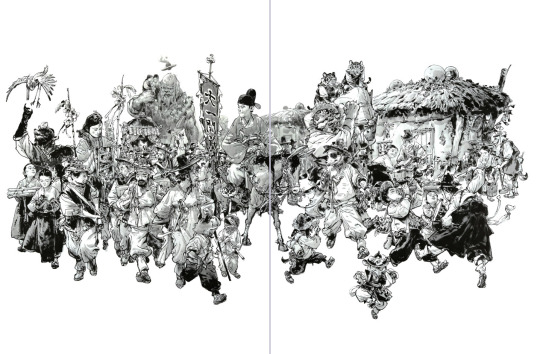
I like both works because to me they are quite similar william morris working on Chaucer is legendary in itself the level of attention to detail is extraordinary and the colour pallette is simple and the typography is grand and archaic in nature a level of excellence rarely seen nowadays.Kim’s work is highly skilled and varied a comic book style but still unique to him I love black and white simplicity as well as colour however I love the detail and excellence shown in both works.To me skill is important to do one’s best and show originality whilst doing so.Clarity,skill and originality are demonstrated here and that is why I was drawn to both artists.
2 notes
·
View notes
Note
Odds for the end of year book asks? Thank you!
1. How many books did you read this year?
*goes to add them up on my list* not counting ones I didn’t like but yes counting plays, it’s a slightly underwhelming 82 so far
3. What were your top five books of the year?
that’s really difficult… maybe Italo Calvino’s Invisible Cities, Jeanette Winterson’s Written on the Body, Tom Stoppard’s Coast of Utopia, Ruth Ozeki’s A Tale for the Time Being, and…. a tie between like ten others? Perhaps Love’s Labours Lost, or To Say Nothing of the Dog, or Grossman’s Life and Fate
5. What genre did you read the most of?
Probably just fiction? Realism? A fair number of historical novels, for something more specific. And a good amount of detective stories
7.What was your average Goodreads rating?
Don’t have a goodreads, sorry. It’d probably be a low 4. something? out of 5
9. Did you get into any new genres?
Not as such. I don’t tend to pick books based on genre really. I suppose I have gotten more interested in the gothic novel, and in the essay/essay collection
11.What was your favorite book that has been out for a while, but you just now read?
Given my reading habits, that’s inevitably gonna be most of them, but to name something I haven’t mentioned before, and thinking of ‘a while’ as not too long ago… I really enjoyed Patti Smith’s Just Kids. I’d been meaning to get to it forever, and it’s a lovely read, bringing the place and people of the New York of that time to life in a really enchanting way.
13. What were your least favorite books of the year?
That’s so much harder, because I don’t write them down on my list! I remember I tried reading the Phryne Fisher novels because I love the show, and found the writing style so bad I couldn’t get through it. I also had to read Chaucer’s Tale of Good Women for a class, and while it’s still Chaucer and has some things going for it, I don’t want him touching Dido or Cleopatra with a ten foot pole. Also, although I liked it enough to note it down, Dissolution by CJ Sansom had some tropes re: historical religion & attitudes that I didn’t love, and featured a few moments of wild historical inaccuracy of the less-fun-more-annoying variety
15. Did you read any books that were nominated for or won awards this year (Booker, Women’s Prize, National Book Award, Pulitzer, Hugo, etc.)? What did you think of them?
I don’t believe so, because I tend to read most contemporary books with a bit of a delay (so many books, so little time. But I really want to read On Earth We’re Briefly Gorgeous and Frankissstein soon, at least!) Having now looked through a list of award winners, I’ve definitely been meaning to read Susan Choi’s Trust Exercise and Olga Tokarczuk’s Flights, as well.
17. Answered here. But I’ve also remembered that I hadn’t anticipated that the writing in How Green Was My Valley would be quite as beautiful as it was.
19. Did you use your library?
My various university libraries, all the time. Also the Archive online library, which is a real treasure
21. Did you participate in or watch any booklr, booktube, or book twitter drama?
Nope. I have been proudly drama free online since the original SKAM show finished up.
23. What’s the fastest time it took you to read a book?This question makes no sense because book lengths vary wildly. So idk, just the other day I read Chekhov’s The Three Sisters, and that only took a couple hours?
25. What reading goals do you have for next year?
That’s something I’ve been thinking about lately. I’d like to get to more of the very long novels I keep putting off reading (maybe finally do Notre Dame de Paris, or finish Andrei Bely’s Petersburg), and also to make time for more critical literature in fields that interest me. To read more in French. Perhaps to tackle Benjamin’s Arcades Project, which I know is everything I love in one neat 1000 page meandering package, but which I worry I may never surface from once I dive in. thanks for the ask!
6 notes
·
View notes
Text
The Chaucer 2023 Book Awards Finalists for Early Historical Fiction
The Chaucer Book Awards recognize emerging new talent and outstanding works in pre-1750s Historical Fiction. The Chaucer Book Awards is a division of the Chanticleer International Book Awards (The CIBAs).
The Chaucer Book Awards competition is named for Geoffrey Chaucer the author of the legendary Canterbury Tales. The work is considered to be one of the greatest works in the English language.…
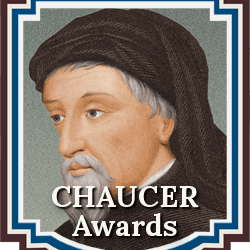
View On WordPress
#1600s#ancient history#Book Award Program#book awards#CAC#Chanticleer Authors Conference#Chanticleer Book Awards#Chanticleer Int&039;l Book Awards#Chanticleer International Book Awards#Chaucer Awards#CHAUCER BOOK AWARDS#Chaucer Contest Update#Chaucer Long LIst#CIBAs#CIBAs Book Awards#Classical#Dark Ages and Medieval Europe#Elizabethan#Historic Novel Society#Historic Writers of America#Historical Fiction Awards#Historical Fiction contests#Historical Novel Society#HNSA#HWA#including pre-history#Pre-1750s Historical Fiction#Pre-1750s Historical Fiction Book Awards#Prestigious#Renaissance
0 notes
Photo

Neil Richard MacKinnon Gaiman born Neil Richard Gaiman, 10 November 1960) is an English author of short fiction, novels, comic books, graphic novels, nonfiction, audio theatre, and films. His works include the comic book series The Sandman and novels Stardust, American Gods, Coraline, and The Graveyard Book. He has won numerous awards, including the Hugo, Nebula, and Bram Stoker awards, as well as the Newbery and Carnegie medals. He is the first author to win both the Newbery and the Carnegie medals for the same work, The Graveyard Book (2008). In 2013, The Ocean at the End of the Lane was voted Book of the Year in the British National Book Awards.
Gaiman's work is known for a high degree of allusiveness. Meredith Collins, for instance, has commented upon the degree to which his novel Stardust depends on allusions to Victorian fairy tales and culture. Particularly in The Sandman, literary figures and characters appear often; the character of Fiddler's Green is modelled visually on G. K. Chesterton, both William Shakespeare and Geoffrey Chaucer appear as characters, as do several characters from within A Midsummer Night's Dream and The Tempest. The comic also draws from numerous mythologies and historical periods.
Analyzing Gaiman's The Graveyard Book, bibliographer and librarian Richard Bleiler detects patterns of and allusions to the Gothic novel, from Horace Walpole's The Castle of Otranto to Shirley Jackson's The Haunting of Hill House. He concludes that Gaiman is "utilizing works, characters, themes, and settings that generations of scholars have identified and classified as Gothic, ... [yet] subverts them and develops the novel by focusing on the positive aspects of maturation, concentrating on the values of learning, friendship, and sacrifice." Regarding another work's assumed connection and allusions to this form, Gaiman himself quipped: "I've never been able to figure out whether Sandman is a gothic."
Clay Smith has argued that this sort of allusiveness serves to situate Gaiman as a strong authorial presence in his own works, often to the exclusion of his collaborators. However, Smith's viewpoint is in the minority: to many, if there is a problem with Gaiman scholarship and intertextuality it is that "... his literary merit and vast popularity have propelled him into the nascent comics canon so quickly that there is not yet a basis of critical scholarship about his work."
David Rudd takes a more generous view in his study of the novel Coraline, where he argues that the work plays and riffs productively on Sigmund Freud's notion of the Uncanny, or the Unheimlich.
Though Gaiman's work is frequently seen as exemplifying the monomyth structure laid out in Joseph Campbell's The Hero with a Thousand Faces, Gaiman says that he started reading The Hero with a Thousand Faces but refused to finish it: "I think I got about half way through The Hero with a Thousand Faces and found myself thinking if this is true – I don't want to know. I really would rather not know this stuff. I'd rather do it because it's true and because I accidentally wind up creating something that falls into this pattern than be told what the pattern is."
Daily inspiration. Discover more photos at http://justforbooks.tumblr.com
13 notes
·
View notes
Text
Do I Have That Book Challenge
Tagged by @books-are-portals. Thank you!
Do you have a book with deckled edges? Yes. Genius Loci, La Belle Sauvage, The Annotated Brothers Grimm.
Do you have a book with 3 or more people on the cover? Yes. Several of my Vorkosigan Saga books, most of my Discworld collection, and my LOTR set, for starters.
Do you have a book based on another fictional story? I don’t think I have any straight-up retellings, but To Say Nothing Of The Dog is inspired by Three Men in a Boat, Anno Dracula mashes up a bunch of vampire and Jack the Ripper stories, Discworld sporks all sorts of stories, and I have several series that riff on mythology and Arthuriana.
Do you have a book with a title 10 letters long? Greywalker and Possession by Kat Richardson, Genius Loci.
Do you have a book with a title that starts and ends with the same letter? Three Men in a Boat.
Do you have a Mass Market Paperback book? So, so, so many. Pretty much everything I own.
Do you have a book written by an author using a pen name? Yes! Mira Grant and Ariana Franklin.
Do you have a book with a character’s name in the title? Some of my Vorkosigan books are omnibuses like Miles in Love and Miles, Mutants, and Microbes and Cordelia’s Honor. I also have Howl’s Moving Castle and Jane Eyre and Jonathan Strange and Mr. Norrell and The Riverside Chaucer and Darwin’s Watch and The Ulysses Voyage and Emma… I’ll stop now.
Do you have a book with 2 maps in it? And there we go with LOTR again, and also The Name of the Rose.
Do you have a book that was turned into a TV show? The World of Pooh? And possibly the His Dark Materials series that’s coming up.
Do you have a book written by someone who is originally famous for something else? ?(celebrity/athlete/politician/tv personality…) Nope. All my famous authors are famous for being authors.
Do you have a book with a clock on the cover? The Watchmaker of Filigree Street.
Do you have a poetry book? I have eleven.
Do you have a book with an award stamp on it? I feel like, miraculously, no.
Do you have a book written by an author with the same initials as you? Nope.
Do you have a book of short stories? Eight of them.
Do you have a book that is between 500-510 pages long? The Harper Hall of Pern. The Foundation Trilogy. Emma. Probably more but I’m not tearing through 700+ books for this.
Do you have a book that was turned into a movie? LOTR again! Half my Narnia set. Dune. All the Austen. Jane Eyre. The Name of the Rose.
Do you have a graphic novel? Again, lots.
Do you have a book written by 2 or more authors? Not counting my anthologies, I presume? Then I think just The Mote In God’s Eye and probably a few of my old linguistics texts.
Tagging @thelibraryofmars, @heretherebebooks if she feels like procrastinating, @elizabethsyson and @therefugeofbooks because they’re some of my newest mutuals, @lizziethereader, @the-knights-who-say-book, and anyone whose username starts with a, h, m, s, or z.
10 notes
·
View notes
Text
Mark Lamoureux: May 2019 Poet of the Month
29 Cheesburgers: #31 Deluxe Bleu Cheese Burger Plate, Cozy Soup ‘N Burger, Astor Place, NYC
for Bill Corbett.
Bill,
I go to the second church of the day, as I must,
alone, & above
the nave of coffee urns—something I never noticed
the handful of times I have come to this place—
is an actual backlit panel of stained glass
depicting two women wrapped in coiling cloth
of cobalt blue proffering
a cheeseburger on a plate
while their lower heaven-stretched arms
cradle a ceramic chalice of Cozy soup,
echoing the similarly light-filled
windows of St. Mark’s on the Bowery from
whence I am come from your memorial, my eyes
stung with tears—
now at the end
as at the beginning
when I first crossed your threshold
some fifteen years ago, just out of hospital,
only days before having watched
the huge ruddy man in the other bed,
Chaucer’s Miller, toss the orderlies around the room like rag dolls,
howling & sobbing like an infant because he didn’t want to take
the pills that would make him heavy & dull
until finally subduing him they put them down
his throat & held his chin like a cat’s & then poured water down
his gullet from a ridiculously tiny
paper cup.
Fifteen minutes later I heard him
spit the unswallowed pills onto the floor. I didn’t take mine
either. He begged me to bring him a plastic model car
& glue please he said
please;
I taught the empty-eyed kid
who paced to one end of the ward & back
again all day, all day to make poems
by picking random words out of the Reader’s Digest
Condensed Books they kept in all the rooms.
Why did you arrange them like that?
I didn’t
that’s the order I picked them in. Fair enough
poetry is the music
of chance; just days later I would be in your parlor
in Columbus Square & I decided to trust
that poetry
would save my life & you were the king
of poetry.
Earlier today I am at the Wahrol retrospective
at the Whitney for the second time, missing
my daughter, who knew the prints from Andy Land
the little book I bought her, signing more moo cow
more Andy Soup; please
please;
with my backpack with my laptop & keys
& presents I bought her in the coat check I can’t shake
the feeling something’s missing;
I lose track of Geof & Karen in the sprawling
exhibition, take a picture of myself in the reflection
of a self-portrait of Andy with a skull on his head—
memento mori I tell myself.
Something’s missing.
Somehow I lose the plastic tag with the number on it
to retrieve my coat & the backpack that I got cheap
because it has somebody else’s initials—IQZ—
monogrammed on the front.
Something’s missing.
The first time I was here I stood with Amabel
in front of Crowd Scene. Peoples she cooed
peoples &
just a few feet away there was Laurie Anderson;
I wanted to ask her to kiss my baby but couldn’t
summon the gumption—
Lou Reed is dead said a voice in my head.
You are dead too; I wanted you to kiss my baby
too.
I used to drink when I felt sad,
which was all the time,
but now I buy things for my daughter instead & today before
your memorial I bought her a little plastic watch
with an owl on the face,
four pairs of little socks with the Peel Slowly
& See banana on them, a spherical strawberry-scented kitty
ball that slowly re-inflates itself
after being squishes & A is for Andy written by him
& his mama.
Something’s missing.
Before I really met you I knew you
from the photograph on the cover
of New & Selected Poems: smiling at the camera
in black & white; behind you a telescope
pointed out the glowing window
toward the sky. I recognized you once outside
of Out of Town news in Harvard Square
& said Hello Bill like I knew you & you said Hello like
I was someone you recognized
but I wouldn’t find myself
at your table for another handful of years,
just out of hospital, a week
after John Wieners died.
I turned 47 last week & bought myself
the Complete Village Vanguard Recordings
of the Bill Evans Trio & listened to Scott LaFaro
playing “Gloria’s Step” over & over again—
the last recording he would make before he
died just 11 days later & I wondered what you thought
of the “You Must Believe in Spring” poem after the song
on Evans’ final that I sent you
just before you died last spring. Memory gorges
every single thing
you wrote in a “Shower in June,”
printed on a broadside with a photo
of Pres outside the Five Spot you inscribed
“For Mark at Aaron’s 30th, 2004”
which hangs just beside my front door & will be the first thing
I see when I exit the cab & unlock the door to my house,
quietly, so I won’t wake Amabel
who will be sleeping upstairs. Memory gorges
every single thing.
Something’s missing.
I will want to listen to the Evans records again,
but will need to wait until morning
because the sleeping baby; I will need to wait
until morning to give my daughter the socks, the kitty,
the book, everything
but the watch which I will save for her birthday
in May & I admit it seems a little wrong
to give a toddler a watch—there’s a point
at which time becomes the enemy,
but I couldn’t resist the little pink owl. Owls
were also the favorite
of my maternal grandma Mabel for whom
Amabel is named & owls
have been appearing everywhere
lately—in an Arthur Sze poem on the wall
of the subway I took downtown,
“Coming Soon—the Owl
Café” on a sign on the smudged-out windows
of a storefront I passed when I was walking
from the Whitney to your memorial
in the Bowery. I guess my point is
the dead remain
in our lives in ways we don’t expect
or understand. A few nights ago two postcards
from you & Gerrit that had been there
since you were both alive fell off
my refrigerator & landed face up
at my feet—there must be scores of postcards
from you squirrelled away in & behind
books on my bookshelves & who knows
where else—I never really file anything
away & I guess now maybe I understand why.
Memory gorges
every single thing. Something’s missing.
This may be the longest poem
I have ever written, meandering, discursive,
I guess probably because I don’t want it
to end because that means somehow this
day in which I said goodbye to you will have ended
but now
the train has pulled into the station
& the conductor is telling me to please exit the train
we all want to go home.
I pack my IQZ backpack quickly
& panic out on the platform.
Something’s missing
but the doors close & the train rumbles
off into the future.
Mark Lamoureux lives in New Haven, CT. He is the author of four full-length collections of poetry: It’ll Never Be Over For Me (Black Radish Books, 2016), 29 Cheeseburgers / 39 Years (Pressed Wafer, 2013), Spectre (Black Radish Books 2010), and Astrometry Orgonon (BlazeVOX Books 2008),. His work has been published in print and online in Elderly, Denver Quarterly, Jacket, Fourteen Hills and many others. In 2014 he received the 2nd annual Ping Pong Poetry award, selected by David Shapiro, for his poem “Summerhenge/Winterhenge.” He teaches at Housatonic Community College in Bridgeport, CT. His chapbook, Maris McLamoureary's DICTIONNAIRE INFERNAL, co-authored with Chris McCreary, was published by Empty Set Press on Halloween 2017.
1 note
·
View note
Text
you broke and the smoke filled you up
A Summer Solo! Super fun happy solo (not really)
Semester 1
Introduction to Drama - 71
Introduction to the Novel - 75
Introduction to Poetry - 74
Avg 73
Semester 2
Classical & Biblical Backgrounds of English Literature - 70
Myth & Epic of the North - 69
Reading Philosophy - 73
Avg 71
Semester 3
Theory and Practice of Literary Criticism - 59
Shakespeare - 60
Chaucer - 75
Avg 65
Semester 4
Arthurian Literature - 42
Old English Level 2 - 39
Modern Poetry - 36
Avg 39
The muggy heat of a July afternoon in Exeter pressed at the living room window as rain threatened in the far distance. The old, stained coffee mug sat forgotten on the side table, its half-drunk contents tepid and still. Cleo’s battered old laptop glowed softly from the floor next to the sofa, its screensaver flickering cheerfully between pictures from her Google gallery, from friend to father to cat to selfie to landscape. Joyful moments (because, after all, who photographed the awful ones?), but Cleo’s eyes were fixed on the scribbly calculations etched on the back page of her notebook.
On the day she’d gotten her all-important GCSE results- the day she’d watched her father’s face light up in a way that she hadn’t seen in years - Cleo had made a decision: every day of her life, she was going to do everything she could to make him smile like that all the time. She’d buried herself in her books and passed her A-Levels with flying colours. She’d been accepted into Durham University. Her father had been full to bursting with pride. She’d been so happy.
She’d called him shortly into her first semester and told him that she loved university so much that she was going to get a PhD and be a professor of English Literature. Her student loan would run out, but if she scored highly enough she’d be able to apply for scholarship funding, and she was sure that she’d secure it if she worked hard enough. He’d told her how proud he was of her decision, promised to help her all he could to realise her dream. Because her dreams were, after all, his dreams too.
Except she’d just failed two second-year modules, and first year only counted for ten per cent of her overall score. She could kiss any shot of even qualifying for the Master’s year goodbye, never mind securing funding for the whole four years of postgraduate study to finish a PhD.
She didn’t understand how she’d let it happen. It had been a hard semester, of course. Awful things had happened. On her birthday, she’d learned of her mother’s grotesque murder and subsequent burial in a bin bag under a half-constructed motorway. How car after car after truck after lorry had sped over her for a decade, while she lay there alone. Ten years of hoping followed by waiting followed by despair, culminated in that one moment in her father’s navy Mondeo on Durham beach - a moment that had torn the air from her lungs and choked what little was left of the wistful child who had never quite left that tower block in London behind. The grief had swallowed her, shielding her from anything kind or good, a paper-thin membrane that cut her off from the friends outside that she knew deep down she needed more than ever. Excuse after excuse. Jude’s going through a hard time too; don’t bother him. Faye hates you now, you’ve upset her somehow already. Imogen has heard enough of your whining and it probably reminds her of her own mother. Nobody needs to hear it.
Spring had been plagued with yet more ghosts - a wolf in the guise of a lamb. Faye had almost died. They’d all, in fact, experienced a brush with death. Some were still recovering. The physical scars had all mostly healed, but the psychological impact, for Faye especially, would remain for a long time.
She supposed, though, the thing to blame was herself. She’d skipped classes, choosing to take on extra DJing shifts so that she could hide in the radio station and lose herself in music - an excuse to be alone and busy. Some of her textbooks from this semester had barely been thumbed through with barely-veiled, vacant disinterest. She’d slept when she shouldn’t have been sleeping. She’d pretended to be asleep when she really ought to have been. She didn’t know why she was surprised to have failed.
She wondered why she didn’t care more.
She jumped when her phone vibrated on her lap to announce her father calling from work. She glanced at the clock. 13:15. Where had the last hour gone?
Cleo looked back at the phone and, reluctantly, she picked it up and swiped the answer button. “Hello?”
“Hello, sweetheart!”
Cleo sat forward, picking her laptop up from the floor and pulling it on to her knee. “Hi, Dad…”
“Well?” His voice rang with expectation and barely-contained pride. “Results day? Are they in yet?”
Cleo flicked off the screensaver, revealing the Durham University results screen, and the little extra note beneath those damning numbers to which she had never paid much heed before…
Resits will take place during the third week of August 2018. Please note that the maximum score that can be awarded for a resit exam is the pass mark of forty per cent.
“Not yet,” she replied, feigning what she hoped was a bored and casual tone. “In fact, I think I might have gotten the dates wrong. I’ll text someone from my class and check.”
“Seriously? Damn, and there I was all excited about bragging everyone at work how smart my daughter is yet again!”
Cleo laughed nervously, her heart sinking under the weight of her lie. “Yeah, maybe another time.” She paused, her dark eyes scanning the resit message again. “Um… dad, Imogen texted me earlier…”
“Who?”
“A girl from - from the radio station. She was asking if I could pop back to Durham a few weeks early. She’s really into the Autumn Festival, and she has all these ideas for our fundraisers, and I suppose she was wanting-”
“Cleo, you can go.”
Cleo paused, a little taken aback that he’d agreed so easily. “Oh. A-are you-”
“Of course I’m sure, love,” he replied gently. “Listen… I know it’s been a hard year. I am so proud of how well you’ve handled it. Go back to Durham in August and have some fun with your friends. God knows you deserve it.”
“What about you?”
“Oh, I’ll be just fine, sweetheart,” he said, and there was a warm, knowing smile in his voice that Cleo couldn’t quite place. “I’ll just have to go and party with my friends. I’ve got loads of friends, you know. I’m a cool dad.”
Cleo let out a reluctant laugh. “Sure.”
“I’d better go, honey. I’ll be home around seven, okay?”
“Okay.”
“I love you.”
“I love you too, dad.”
Her phone bleeped to signal the end of the call and Cleo looked blankly down at her computer screen, a small gnawing sensation in her stomach that promised to grow and grow until it ate her from the inside out.
To request a resit, please click here.
5 notes
·
View notes
Text

FINISHING LINE PRESS BOOK OF THE DAY:
Let the Whales Escape by R. W. Haynes
$19.99, Full-length, paper
https://www.finishinglinepress.com/product/let-the-whales-escape-by-r-w-haynes/
R.W. Haynes, Professor of English at Texas A&M International University, has published poetry in many journals in the United States and in other countries.As an academic scholar, he specializes in British Renaissance literature, and he has also taught extensively in such areas as medieval thought, Southern literature, classical poetry, and writing. Since 1992, he has offered regular graduate and undergraduate courses in Shakespeare, as well as seminars in Ibsen, Chaucer, Spenser, rhetoric, and other topics. In 2004, Haynes met Texas playwright/screenwriter Horton Foote and has since become a leading scholar of that author’s remarkable oeuvre, publishing a book on Foote’s plays in 2010 and editing a collection of essays on his works in 2016. In 2016, Haynes received the SCMLA Poetry Award ($500) at the South Central Modern Language Association Conference. He also writes plays and fiction.
In the tradition of other contemporary modernist sonneteers such as Paul Muldoon, the writing here abounds in subtly-crafted meticulous metered rhyme, where whimsical notions of human behaviour combine with wry self-depreciation. Haynes’s works imply, against an Aristotelean background of comedy and tragedy, a blend of social satire combining realistic scenes with surreal ones so that fantasy often merges with unsentimental social realism. Haynes is both mischievious and romantic, though the former frequently overwhelms the latter, whilst at the same time he often strikes a very sombre note, as indeed in the very title of the work with its allusion to the poetic soul and its plea to the world to acknowledge grandeur over the commonplace.
–Robin Ouzman Hislop, Editor, Poetry Life & Times. Avila. Spain. Summer 2018.
In our fashionably iconoclastic age, where love of freedom and hatred of form mirror each other, and any sonorous and amorphous expectoration, however dimwitted or dissonant, may pass for a poem, it will doubtlessly seem quaint to praise a poet for his mastery of form in his ironically insightful work. Nonetheless, I venture to claim that Robert Haynes‘s Let the Whales Escape is a feast for mind and ear: his poems are mercifully objective and wickedly barbed, but never merely critical of our sophisticated barbarity; their prosodic brilliance is deeply rooted in the tradition of English poetry. In sum, they are poetry at its best.
–Antonio Marino López, Professor of Greek Philosophy, Universidad Nacional Autónoma de México — Acatlán
PREORDER SHIPS JULY 15, 2019, RESERVE YOUR COPY TODAY
https://www.finishinglinepress.com/product/let-the-whales-escape-by-r-w-haynes/ #FLP #poetry
1 note
·
View note
Text
#Review#FollowingSea #LeahAngstman #HFVBT
Out Front the Following Sea by Leah Angstman
Publication Date: January 11, 2022 Regal House Publishing Hardcover, Paperback, eBook, Audiobook; 334 pages
Genre: Historical / Literary / Epic
**Shortlisted for the Chaucer Book Award**
OUT FRONT THE FOLLOWING SEA is a historical epic of one woman’s survival in a time when the wilderness is still wild, heresy is publicly punishable, and being…
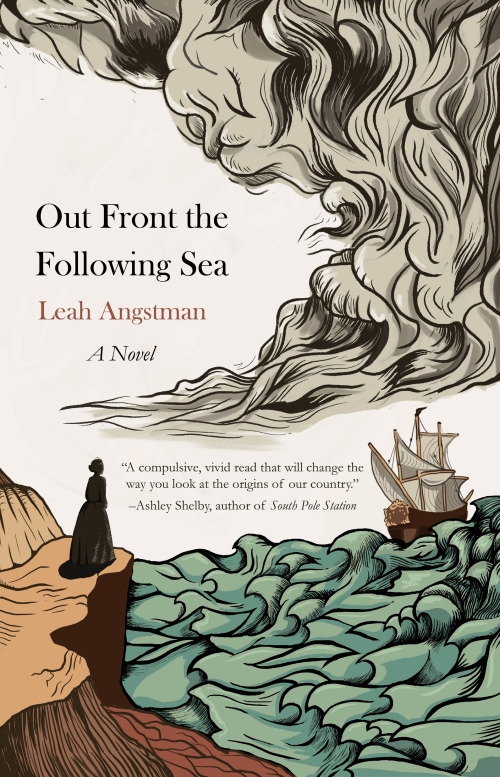
View On WordPress
0 notes